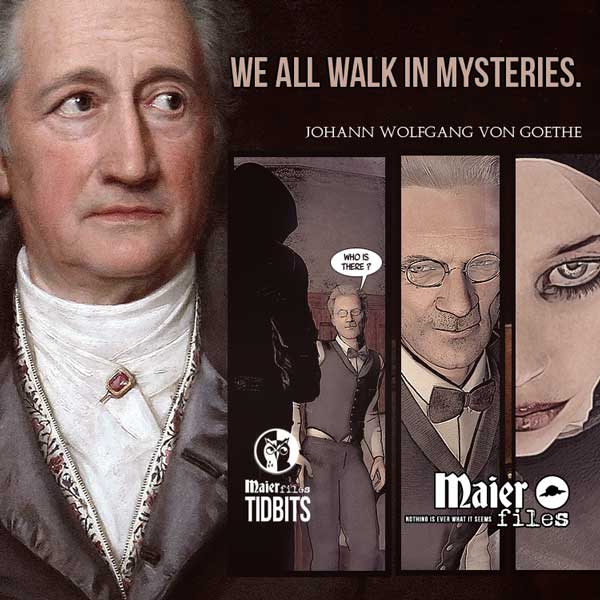Socrates sometimes spoke of his daemon, meaning a good spirit who guided him through life. This might seem an alien concept for most of us today. But one can not deny as a matter of historical fact that folks who believed in idealism as a philosophy of life have always tended to trust in spirits, gods and angels.
When it comes to the great-weaving cosmic thoughts, the active principles behind the appearances of things, many idealists and romantics have asked themselves how far it is acceptable to think about them as conscious beings like ourselves. Cicero and Newton have considered these “Intelligencers”, to use Newton’s term for them were neither crudely impersonal nor crudely personal.
Cicero was one of the great forces for reform in the Roman empire. He looked upon his initiation at Eleusis as the great formative experience of his life. In “The nature of the Gods” he gives a passionate exposition of the Stoic idea of the moving spirit of the universe, the guiding force that makes plants seek nourishment in the earth, gives animals sense, motion and an instinct to go after what is good for them that is almost akin to reason.
The gods should not really be imagined as having bodies like our own, but are clothed in the most ethereal and beautiful forms. He writes, “we can see their higher, inward purpose in the movements of the stars and planets.” When Rome’s political machinations finally caught up with Cicero, he stoically bared is neck to the centurion’s sword. As Socrates once adviced to Evenus; the one aim of those who practice philosophy in the proper manner is to practice for dying and death.
Initiates of the Mystery schools, encountered these disembodied Intelligencers in altered states of consciousness. It is Goethe perhaps who writes best in what it feels like to be a believer of the ancient values in modern times. He writes about feeling the true presence of living interconnections with the natural world and living connections with others, although such connections may possibly not be measurable or visible. He also writes concerning the universal spirits that hold everything together. What Newton called “the Intelligencers”, Goethe calls “the Mothers “.

Goethe writes:
We all walk in mysteries. We do not know what is stirring in the atmosphere that surrounds us, nor how it is connected with our own spirit. So much is certain – that we can at times put the feelers of our soul beyond its bodily limits … one soul may have a decided influence upon another, merely by means of its silent presence, of witch I could relate many instances.
It has often happened to me that, when I have been walking with an acquaintance, and have had a living image of something in my mind, he has at once begun to speak of that very thing. I have also known a man who, without saying a word, could suddenly silence a party engaged in conversation by the mere power of his mind …
We all have some electrical and magnetic forces within us; and we put forth, like the magnet itself, some, attractive or repulsive power … With lovers this magnetic power is particularly strong and acts even at a distance. In my younger days I have experienced cases enough, when during my solitary walks, I have felt a great desire for the company of a beloved girl, and have thought of her till she was really come to meet me. ‘I was so restless in my room’, ‘that I could not help coming here.’
Wir wandeln alle in Geheimnissen. Wir sind von einer Atmosphäre umgeben, von der wir noch gar nicht wissen, was sich alles in ihr regt und wie es mit unserm Geiste in Verbindung steht. So viel ist wohl gewiß, daß in besonderen Zuständen die Fühlfäden unserer Seele über ihre körperlichen Grenzen hinausreichen können und ihr ein Vorgefühl, ja auch ein wirklicher Blick in die nächste Zukunft gestattet ist.
Auch kann eine Seele auf die andere durch bloße stille Gegenwart entschieden einwirken, wovon ich mehrere Beispiele erzählen könnte. Es ist mir sehr oft passiert, daß, wenn ich mit einem guten Bekannten ging und lebhaft an etwas dachte, dieser über das, was ich im Sinne hatte, sogleich an zu reden fing. So habe ich einen Mann gekannt, der, ohne ein Wort zu sagen, durch bloße Geistesgewalt eine im heitern Gespräch begriffene Gesellschaft plötzlich still zu machen imstande war. Ja er konnte auch eine Verstimmung hineinbringen, so daß es allen unheimlich wurde.“
„Wir haben alle etwas von elektrischen und magnetischen Kräften in uns und üben wie der Magnet selber, eine anziehende und abstoßende Gewalt aus, je nachdem wir mit etwas Gleichem oder Ungleichem in Berührung kommen. … Unter Liebenden, ist diese magnetische Kraft besonders stark und wirkt sogar sehr in die Ferne. Ich habe in meinen Jünglingsjahren Fälle genug erlebt, wo auf einsamen Spaziergängen ein mächtiges Verlangen nach einem geliebten Mädchen mich überfiel, und ich so lange an sie dachte, bis sie mir wirklich entgegenkam. „Es wurde mir in meinem Stübchen unruhig,“ sagte sie, „ich konnte mir nicht helfen, ich mußte hierher.“
Goethe went on to speak about the living connections that underlie such phenomena …
‘Dwelling in eternal obscurity and loneliness, these Mothers are creative beings; they are the creative and sustaining principles from which proceeds everything that has life and form on the surface of the earth. Whatever ceases to breathe returns to them as a spiritual nature, and they preserve it until there arises occasion for its renewed existence. All souls and forms of what has been, or will be, hover about like cloud in the vast space of their abode … the magician must enter their dominion, if he would obtain power over the form of a being …’
So in ewiger Dämmerung und Einsamkeit beharrend, sind die Mütter schaffende Wesen, sie sind das schaffende und erhaltende Prinzip, von dem alles ausgeht, was auf der Oberfläche der Erde Gestalt und Leben hat. Was zu atmen aufhört, geht als geistige Natur zu ihnen zurück, und sie bewahren es, bis es wieder Gelegenheit findet, in ein neues Dasein zu treten. Alle Seelen und Formen von dem, was einst war und künftig sein wird, schweift in dem endlosen Raum ihres Aufenthaltes wolkenartig hin und her; und umgeben die Mütter, und der Magier muß also in ihr Reich gehen, wenn er durch die Macht seiner Kunst über die Form eines Wesens Gewalt haben und ein früheres Geschöpf zu einem Scheinleben hervorrufen will.



